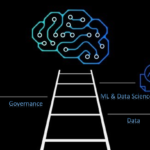AI in practice and implementation strategies
/ /
Artificial Intelligence (AI) has the potential to revolutionize various sectors, but its successful implementation requires careful planning and execution. This article explores practical strategies for implementing AI solutions, enabling organizations to harness the benefits of AI effectively and maximize its impact across different domains.
- Define Clear Objectives and Use Cases: Before embarking on an AI implementation journey, organizations must clearly define their objectives and identify relevant use cases. By focusing on specific pain points, inefficiencies, or opportunities for improvement, organizations can prioritize AI initiatives that align with their strategic goals. Establishing well-defined objectives and use cases provides a roadmap for successful implementation.
- Data Quality and Preparation: High-quality data is the foundation of successful AI implementation. Organizations should assess the availability, quality, and accessibility of their data to ensure it is suitable for AI applications. Data preparation, including cleaning, normalization, and aggregation, is often necessary to optimize data quality for AI algorithms. Furthermore, organizations should consider data governance frameworks and establish protocols for data collection, storage, and protection to ensure compliance with regulations and ethical standards.
- Collaborate with Domain Experts and Data Scientists: AI implementation requires collaboration between domain experts and data scientists. Domain experts possess the necessary contextual knowledge to guide the AI solution’s development, ensuring its relevance and alignment with operational needs. Data scientists contribute their technical expertise to develop and train AI models, leveraging their understanding of algorithms, feature engineering, and model evaluation. A close collaboration between these two groups facilitates the creation of effective and impactful AI solutions.
- Start Small and Iterate: To mitigate risks and build confidence, organizations should adopt an iterative approach to AI implementation. Starting with small-scale pilot projects allows for testing and fine-tuning AI solutions before scaling them up. Iterative implementation enables organizations to learn from initial successes and failures, adapt to challenges, and continuously improve the AI solution based on user feedback and changing requirements. This incremental approach minimizes disruption and maximizes the chances of achieving positive outcomes.
- Ethical Considerations and Bias Mitigation: Addressing ethical considerations and mitigating biases are crucial components of AI implementation. Organizations should proactively assess potential biases in AI algorithms, datasets, or decision-making processes to ensure fairness and prevent discriminatory outcomes. Ethical guidelines, such as those outlined in the European Union’s AI regulations, should be integrated into the AI implementation strategy. Regular monitoring, auditing, and evaluation of AI systems help identify and rectify biases and ethical concerns.
- Continuous Learning and Adaptation: AI is an evolving field, and organizations must embrace a culture of continuous learning and adaptation. Encouraging knowledge sharing and professional development among employees fosters a deeper understanding of AI technologies and their applications. Staying updated with the latest advancements and best practices in AI implementation ensures that organizations can leverage new techniques and tools to enhance their AI solutions continuously.
- User Adoption and Change Management: Successful AI implementation relies on user adoption and change management. Organizations should invest in user training and provide clear communication to build trust and acceptance of AI solutions among employees. Engaging end-users from the early stages of implementation, soliciting their feedback, and addressing their concerns fosters a positive attitude towards AI. Change management strategies that address potential resistance, ensure user support, and highlight the benefits of AI are essential for smooth adoption.
Posted in On demand conference


































